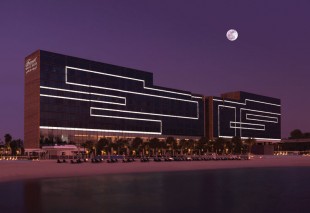

Great expectations

David Roberts, Fairmont Raffles Hotels International executive vice president operations Asia Pacific, Middle East and Africa talks to Hotelier about Fairmont’s business plans in the region and beyond.
In a region dominated by big brands, Fairmont may still be a small seed, but it has a lot of potential. The brand’s expansion in the Middle East market is one which Fairmont Raffles International executive vice president operations Asia Pacific, Middle East and Africa David Roberts is keen to talk about when we meet for a coffee in Fairmont’s Dubai property at the outset of ATM.
It is an exciting time for the brand in the region, following the opening of two important properties for Fairmont over the past two years, in Makkah and Abu Dhabi, and the news that Fairmont’s previously delayed hotel on the Palm Jumeirah Dubai is set to open in July 2012.
“Strategically Makkah is probably one of the most important locations for us on a global basis, and the reason for that is that it commands such a presence and in turn matches the presence we have in London at the Savoy, in New York at the Plaza and from a strategic point of view, it has the ability to influence business on a global scale,” he explains.
“Our property in Makkah has exactly the same customer profile as our properties in London, in New York, and in some of our more iconic hotels on a global scale with Europe as an example, so there is no undermining the importance of Makkah to us in terms of future growth,” Roberts adds.
Abu Dhabi too was an important strategic opening for the brand, and it is a destination which will see another Fairmont property before long.
“We have a project on the Corniche in Abu Dhabi that has been announced and is still at architectural design and is in fact probably more alive than it has been for a long moment in time — it is a stunning location and we are very excited to be there,” he enthuses.
“There is no question that the market in Abu Dhabi has got a lot of supply coming online — we recognise that — but our location is going to be second to none, and that will give us a unique positioning in that market and will separate us from a lot of other hotels in development or opening right now,” he adds.
The company is planning to continue expanding in the region, as Roberts explains: “Our presence in the Middle East is relatively small right now, and if we look at the future, we see ourselves increasing that pipeline significantly.”
“We will be increasing our presence in Saudi Arabia, we will also be increasing our presence in the United Arab Emirates, and we will be strategically looking for partnerships in Qatar and also in some other countries — it is very important for us to gain larger distribution in this region, and consequently we are talking to people on a day to day basis about opportunities here,” he adds.
The brand’s move towards Qatar is no surprise — following the successful 2022 World Cup bid, most hotel companies seem to be aiming to increase (or establish) their presence in the country — but Roberts says that the World Cup isn’t as big a draw for Fairmont as one might think.
“I think that in Qatar the future of the World Cup is a bit too far down the line to really deserve too much recognition today,” he muses, “We have hotels in South Africa and we were actually there for the World Cup during 2010.
It was a very exciting summer of course, but it doesn’t provide for the long lasting success — you have to build that from the ground up, you have to make sure that you have the fundamentals right and the business works and then when the World Cup comes along, it is exciting, but then you’ve still got some fundamentals in place after that,” he continues.
Thinking strategically is something which Roberts clearly takes pride in, explaining that in every area — from source markets to staffing — there are clear plans in place for the future; though this doesn’t stop the company from recognising opportunity when it knocks, he says.
“In the short-term the recent unrest in the region has generated unexpected, very welcomed, demand in our hotels in the Middle East, and as a result, some hotels that came on line in the fourth quarter of last year were able to open with relatively high occupancies — probably higher than we anticipated and expected,” Roberts explains.
“Subsequently, our two operating hotels in the UAE both have had very strong first quarters and we can see that momentum continuing in the near future.
We don’t have a lot of visibility looking into the fourth quarter of 2011, but nonetheless we are optimistic that the business that has come to the UAE in the last quarter will enjoy the fact that it is very easy to do business here, it is a very safe destination and they will perhaps begin to repeat their stays.”
Fairmont Hotels in the Middle East and North Africa
Fairmont has six hotels in the region:
UAE, Abu Dhabi — Fairmont Bab Al Bahr
Egypt, Cairo — Fairmont Towers, Heliopolis
Egypt, Cairo — Fairmont Heliopolis
Egypt, Cairo — Fairmont Nile City
UAE, Dubai — Fairmont Dubai
Saudi Arabia, Makkah — Makkah
Clock Royal Tower, a Fairmont Hotel
About the company
Fairmont is one of three brands which make up Fairmont Raffles Hotels International (the other brands being Raffles and Swissôtel). Each brand has its own unique identity and each has a presence in the Middle East market — Fairmont with six hotels, Raffles with two, and Swissôtel with one hotel to open in Makkah this year.